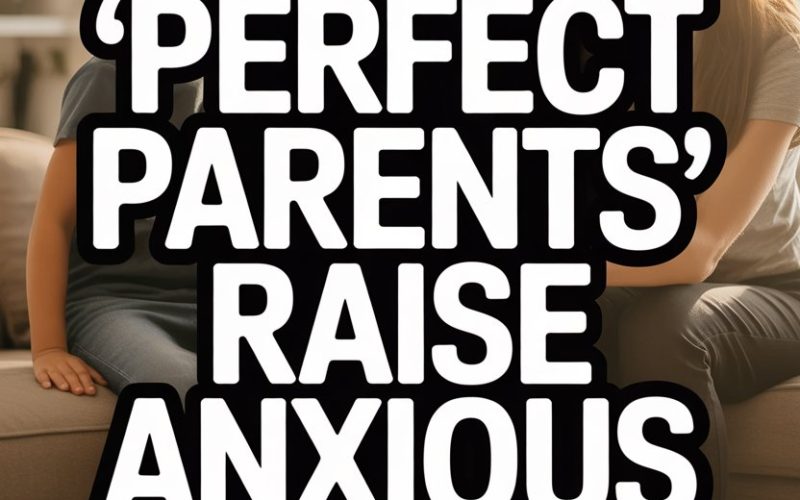Perfection.
That golden unicorn every parent’s chasing, even while their toddler’s eating lint off the carpet. The idea that we must be flawless, never raise our voice, never lose the plot, never let them see us sweat.
If you’re aiming for the mythical status of “Perfect Parent,” you might want to park that ambition for a minute.
Turns out, being too perfect has a funny way of making our children… well, worry a bit too much.
Chasing Perfection Sets the Bar Too High
Kids adore praise. They beam over a wobbly stick figure or a slightly burnt muffin.
But when parents consistently model only excellence—tidy homes, Instagram-level birthday parties, never a hair out of place—children get the wild idea that only flawlessness earns attention.
Research from Harvard backs up this worry: perfectionist parenting styles often correlate with children who fear making mistakes and struggle with anxiety.
If mum never lets a dinner go wrong and dad never fumbles the IKEA furniture assembly, kids may think mistakes are catastrophic.
Suddenly, dropping a biscuit isn’t just a minor disaster—it’s the end of the world.
Kids Mirror What They See
Monkey see, monkey do. If you’re stressed about every misplaced sock or slightly-off school assignment, kids take their cue.
They start to believe mistakes are monsters under the bed—best avoided at all costs.
This modelling effect is stronger than any lecture or motivational pep talk. Even if you say, “It’s okay to make mistakes,” but visibly melt down over spilled juice, guess what lesson sticks?
Anxious parents often pass their worry down in subtle, everyday ways.
As psychologist Dr. Kate Gowers notes, kids watch our reactions to setbacks, and those reactions shape their own emotional responses (BBC).
The Problem With Bubble-Wrapping Childhood
Every parent wants to shield their child from pain. Scraped knees? “Let’s get a plaster.” Friend trouble? “I’ll talk to their mum.” That urge is perfectly natural.
The trouble starts when we swoop in for every hiccup, never letting kids weather small storms.
Constant rescuing teaches kids the world is terrifying, and that they’re not equipped to handle it. Anxiety sneaks in when kids think, “I can’t cope unless Mum or Dad steps in.”
Psychology researchers call this snowplough parenting—clearing all obstacles ahead of our kids. But those same researchers warn that overprotection is a ticket to anxious, risk-averse children (Psychology Today).
When Encouragement Turns Into Pressure
“You can do anything if you try hard enough!” Sounds supportive, right? Well, not always.
If encouragement morphs into an expectation of constant improvement, children can feel like they’re on a never-ending treadmill.
Some kids hear “You can do it!” but interpret it as “You must do it, perfectly, every time.” Cue the pressure, cue the anxiety.
This is especially true for kids who are naturally sensitive or already lean toward worry.
Perfectionism Leaves No Room for Resilience
What happens when things go wrong? (Because, spoiler alert: things will go wrong.) Children raised in an environment where mistakes are rare or hidden might not know what to do when life throws them a curveball.
Resilience isn’t built on easy wins. It grows out of setbacks, dusting yourself off, and having a giggle at your own expense.
If parents never admit their missteps, kids don’t see how to recover—and that’s a recipe for anxiety about the unpredictable.
Perfectionism and the Social Media Trap
It’s not just the home environment—kids are soaking up messages from every glowing rectangle in the house. Social media doesn’t exactly reward authenticity. (Show me a single Instagram feed celebrating average Tuesday chaos.)
When parents curate their own lives for an audience, kids notice. They may feel pressure to measure up—even if they’re not old enough for their own accounts yet.
A study from Pew Research Center found that even preteens absorb perfectionist messages from their parents’ online lives.
Sometimes, the best thing you can do for your child’s anxiety is to leave the filters off and upload the real-life mess.
Ways to Embrace Imperfection and Ease Anxiety
Ready to swap perfection for peace? Here’s how you can model imperfection—and help your child breathe easier.
Celebrate the Glorious Flop
Burnt dinner? Wrong turn on the school run? Forgot it was dress-up day? Announce your mistake, have a laugh, and show your child that errors are part of living.
Try saying: “Wow, I really mucked that up! Oh well, next time I’ll remember to set the timer.”
Kids who see parents handle mistakes with humour and grace learn that it’s okay to falter—and that a misstep rarely spells disaster.
Let Kids Solve Their Own Small Problems
Resist the urge to swoop in every time a challenge pops up. Lost toy? Let them look for it. Spat with a mate? Offer guidance, but don’t dictate every step.
Coach from the sidelines instead of playing the whole game. This builds confidence and teaches kids to handle uncomfortable feelings as they arise.
Talk About Times You Fell Short
Share stories about a time you didn’t win, didn’t ace the test, didn’t land the job. Speak honestly about how it felt, and what you learned.
Children treasure these stories. They reveal that even the adults they adore aren’t invincible—and that setbacks are survivable.
Practice Self-Compassion in Front of Your Kids
Be gentle with yourself, out loud. If you catch yourself griping about your mistakes, reframe it: “Everyone has a wobble now and then. That’s how we learn.”
Modelling self-compassion lets children internalise a kinder, gentler inner voice—the antidote to the harsh self-criticism at the root of so much anxiety.
Ditch the Comparison Game
Every family has a neighbour whose lawn is always greener (and whose children apparently speak fluent Mandarin by age five). Smiling politely and steering clear of the comparison trap keeps expectations at a healthy level.
If you find yourself falling down the “Shoulds” rabbit hole, pause. Your child doesn’t need to be the best, only their best. (And some days, their best is just getting through without launching a grape across the kitchen.)
Normalise Anxiety as a Human Experience
Everyone gets nervous. Everyone worries. Speak openly about your own jitters before a big work meeting, a tricky phone call, or a doctor’s appointment.
By naming your own nerves, you take the sting out of anxiety—and show your kids it isn’t something to hide or be ashamed of.
Encourage Effort, Not Outcome
Praise your child’s effort, not just achievements. “I noticed you kept practising even after missing a few notes. That’s real persistence.”
This helps them value progress over perfection, and teaches that growth is messy (and sometimes involves eardrum-splitting recorder solos).
Let Boredom (and Discomfort) Happen
Unscheduled time? Boredom?
That’s where creativity and resilience are born. Resist the urge to fill every moment or fix every whinge.
When children face discomfort, from boredom to mild disappointment, they learn to cope—and discover their own strengths.
Check Your Own Anxiety
If you’re up at night worrying about whether you’ve ruined your child forever by handing over the iPad… you’re not alone. Parental anxiety often seeps into day-to-day life.
Chatting with a mental health professional or joining a parenting group can help. As the saying goes: put on your own oxygen mask before helping others.
The Magic of Good Enough
Here’s a secret: “Good enough” parenting is, in fact, more than enough. Your love, presence, and willingness to admit your own flaws teach your child exactly what they need to know.
No parent has ever managed perfection—and the ones who try the hardest often have the most anxious children.
Show your kids that life is a grand mess of triumphs, failures, and muddling through. Show them it’s safe to stumble.
That’s the real ticket to raising kids who are confident, resilient, and just a little bit less anxious.
Pass the burnt toast. It’s all part of the plan.




